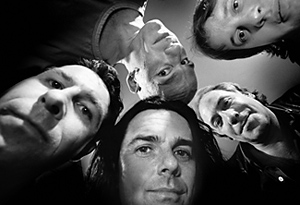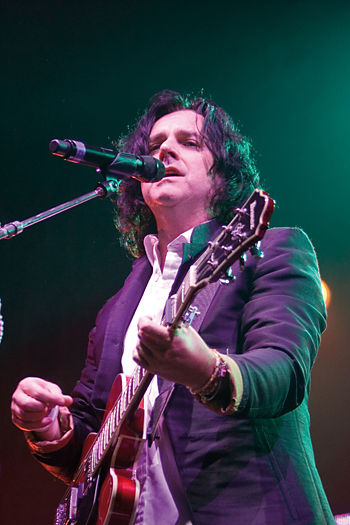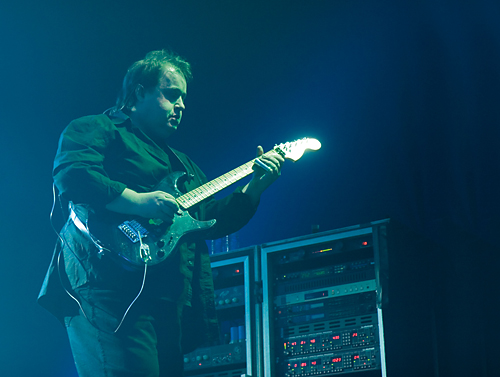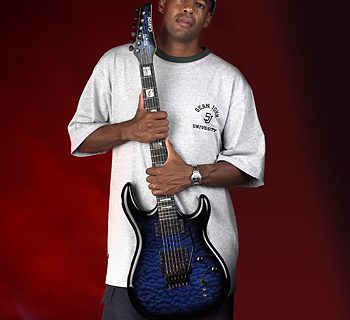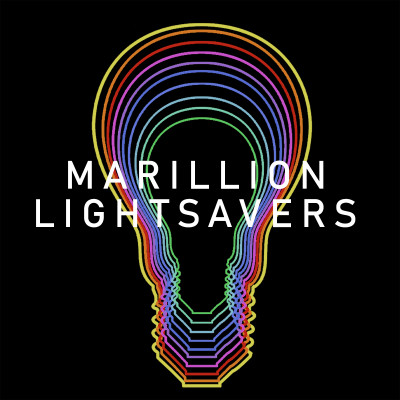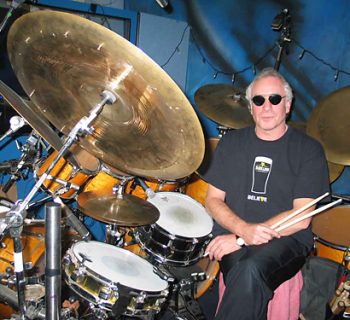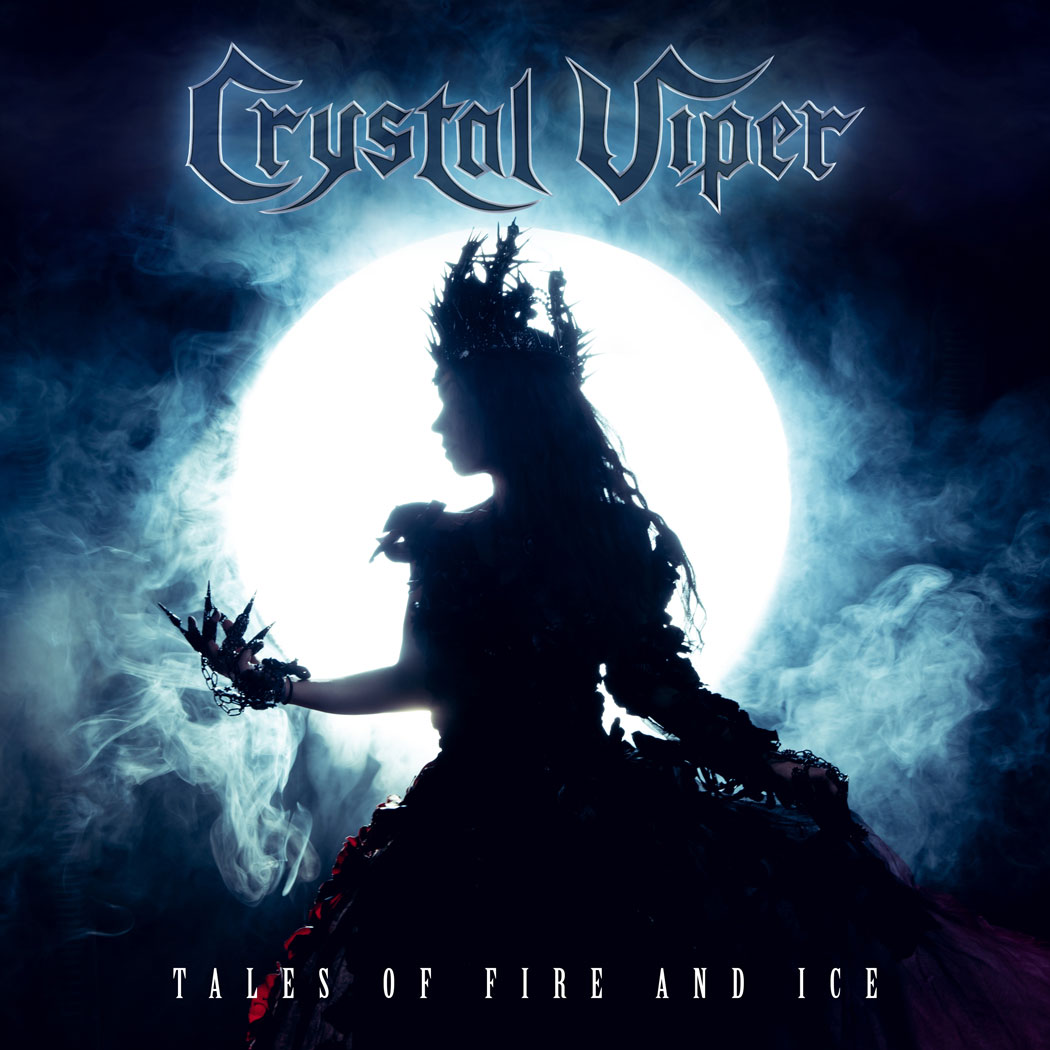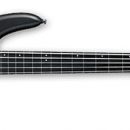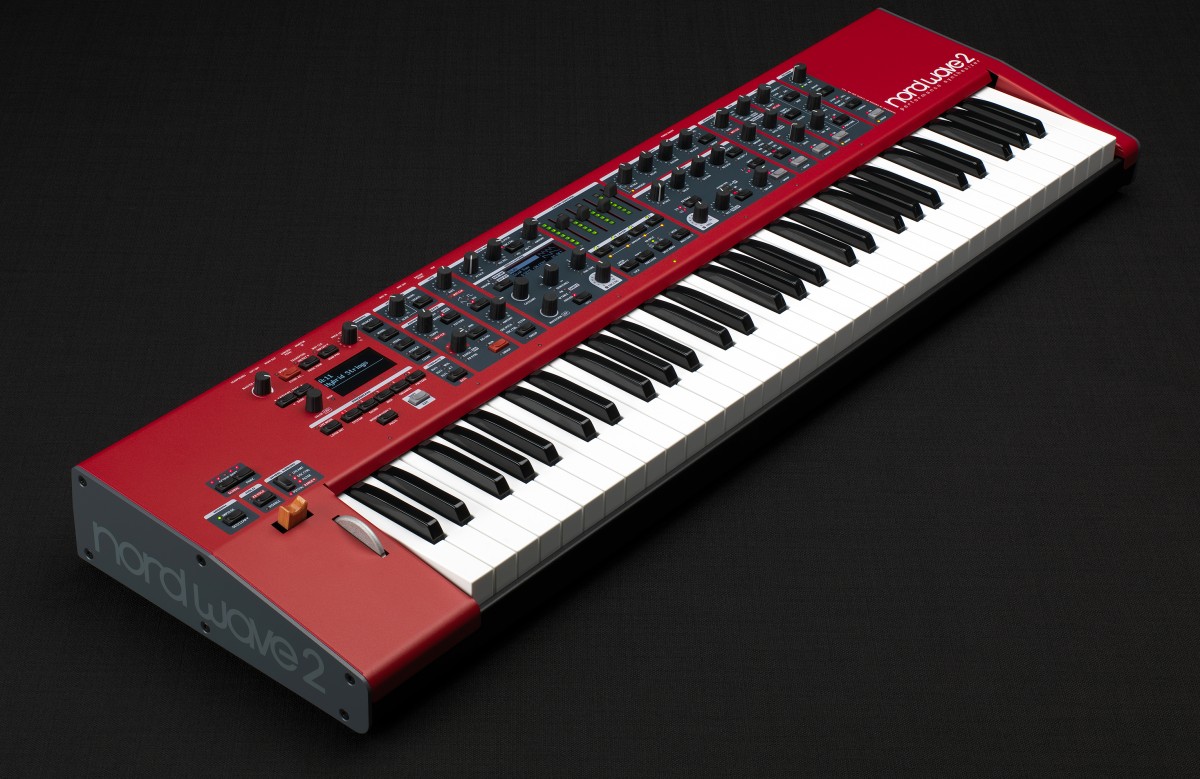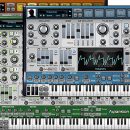So who do you think Marillion are? If you live in North America, odds are that you don’t know who they are at all. Perhaps Marillion is just a neat band name that you’ve seen floating around for years. Perhaps (if you’re over thirty) you think it’s some band that sounds like early Genesis. Maybe you think they’re a progressive rock band. Maybe you think they’re an Eighties pop group.
Whatever you think they are, they surely are not that, because it’s really quite hard to categorize a band that makes beautiful, powerful, emotional, and melodic music that defies the genre-specific requirements of that most horrible communications medium we call American FM radio.
Marillion are an English rock band of the highest melodic order. We consider them a progressive rock band because they don’t conform to industry standards. They make music for themselves first, on their own terms, and fans anticipate being surprised by each new release varying to some degree in style from the previous album, yet they always sound like Marillion.
Marillion create beautiful, melodic songs composed of intricate arrangements that delve into various time signatures, feature dense layers of sound, lush synthesizers, shimmering guitars with delays and soaring melodic leads, bass lines that tell stories within stories, beautiful and haunting vocals, and drumming that exemplifies a perfect balance between precision and taste.
It’s easier to say what kind of progressive rock Marillion are not: They are not metal-based like Dream Theater or Tool, though you can rest assured that the members of those bands are big Marillion fans. You can safely play Marillion for your girlfriend or wife, and if their songs were on American radio, they would garner a huge following from people tired of the same mindless drivel. If you’ve enjoyed music from bands such as Yes, Rush, Pink Floyd, The Police, and Genesis, you would find much to enjoy about their music. But you can’t rest there – you’d also need to enjoy music with pop sensibilities ranging from The Beatles to The Beach Boys, throw in some electronic/dub, mix in some acoustic tunes, and then wear your classic blues rock hat as well.
Every member of Marillion: vocalist Steve Hogarth, guitarist Steve Rothery, keyboardist Mark Kelly, bassist Pete Trewavas, and drummer Ian Mosley is an outright superb musician. Though you may be familiar with some of them from their work in side projects with other musicians and bands, these five musicians have been together without a band lineup change for the past ten studio releases. Clearly, they have found a musical home and family within this band, and for that we are all truly grateful.
This April marks the release of Marillion’s fourteenth studio release, aptly titled Somewhere Else, since it takes their sound a few big steps away from 2004’s stunning, double-album concept CD, Marbles.
Before spending some time with the band revisiting those ten fantastic records, it should also be noted for the uninitiated that Marillion fans are the most devoted and borderline obsessive fans that any band could ever have. Sure, as a serious musician you may find this comment a bit comical and out of place in a MusicPlayers.com feature, but consider this:
- In 1997, lacking adequate tour support from their label to bring the European tour to the United States, fans in America raised over $60,000 via the Internet in order to finance the band making a cross-Atlantic trip to tour here.
- In 2000-2001, parting ways with their last record label and choosing to publish future releases on their own label, the band made headlines for launching a successful pre-order campaign that raised money to record their next album, Anoraknophobia. They sold 12,000 advance copies before any music had been recorded!
- Every other year, the band hosts a weekend getaway where they invite their fans to join them. During the weekend-long event, the band performs a concert featuring one of their random albums in its entirety, and they even have contests to let musician fans sit in with the band on a song, and more!
We were fortunate enough to spend a week in March talking with all of the members of Marillion about not only the new record, Somewhere Else, but also about the past eighteen years since vocalist Hogarth stepped in to replace their original singer, Fish.
In this album retrospective, we sought stories that were completely random – the first stories that came to mind, actually, and we definitely got that – everything from tales of gear mishaps to hot air balloons!
I remember seeing him years later, staring in a really awful sixties movie that was mildly pornographic. – Steve H
 1989 Seasons End
1989 Seasons End
Producer: Nick Davis
Steve H: I think more of hot air balloons that anything else. We recorded Seasons End in Hook End Manor recording studios, and by some freak of nature the day we moved into that studio the sun came out and, very rarely for England, it stayed out for nine solid weeks. It was the most wonderful, early, early summer that kicked in, in April. I thought I’d died and gone to heaven. I was living literally in the lap of luxury, I felt like Lord Byron. I was sleeping in this big oriental bedroom, which I christened the “Opium Den,” which later surfaced during Brave.
Ian: It was an absolutely stunning place. I just remember being there for about three or four months in the blazing hot sun, a swimming pool, and being waited on hand and foot, which reflects the title track of the album and the lyrics that go something like, “It will never snow in England again!”
Steve H: And at night when we had finished recording we use to make hot air balloons with birthday cake candles, and those plastic bags that dry cleaners put suits in when they send them back, and balsa wood. We used to make crosses out of balsa wood and glue all the birthday candles to them, and light the candles and they would inflate the dry cleaning bag that was stretched over the wood, and they would go up into the air, into the night sky… crosses of light. I think of that first.
Ian: A friend of mine showed me how to make hot air balloons – it’s a very peaceful hobby. It’s very peaceful and it glows like a star. So some of us would just sit down on the tennis courts and watch this happen. Mark Kelly got wind of it and so he started building things with two bags and three bags and then it became an obsession. He started buying gas canisters and space blankets. So by the end of the recording session, we had nearly full-sized balloons that were being launched and would follow them in a little red van across the English countryside! (laughs) We ended up using high-altitude oxygen cylinders to launch these balloons and it just got out of hand, but I just remember it being a very jubilant experience.
Mark: That was my first experiment with using a computer to control MIDI patch routing and program changing on stage, but there wasn’t anything in those days you could buy off the shelf like a piece of software. I had an Atari 1040 ST. A friend of mine, who knew nothing about MIDI, was a programmer, and offered to program it. So I told him what I wanted: “MIDI notes consist of three bytes…” I told him the basics of how MIDI works, got him a few books, and he said “Oh yeah, I’ll write you a program to do that.”
So he wrote this program that I took out on the road for Seasons End, and you know the way these things always go, it worked fine in rehearsals, and as soon as we got to the first gig, it started crashing terribly and going awfully wrong, and it was very embarrassing, and the rest of the band was ready to murder me. I strained my friendship with this good guy quite severely because he spent months working on this program and I ditched it during the first or second week of the tour and went to some hardware solution that wasn’t quite as versatile, but at least it didn’t crash.
Pete: The funniest thing about Seasons End is that there is a line [in the title track] that John Helmer wrote in that song where it says it will never snow again in England, and the day we happened to be recording that song there was a blizzard going on. We could see out of the window and there was just snow everywhere! (laughs) And so that kind of brought some chuckles and almost killed the atmosphere actually, ‘cause it’s obviously an immense song with an immense subject, and to have the five of us rolling around laughing wouldn’t have been a great way to capture that one.
Steve: Yeah, a great time had by all.
Dave said, ‘You can either make an album in eight weeks or you can make a work of art. What do you want to do?’ And we said we’ll make a work of art. – Mark
 1991 Holidays in Eden
1991 Holidays in Eden
Producer: Christopher Neil
Steve H: I tend to think of the producer, Chris Neil, who was always a good laugh to work with. It was a very strange choice in many ways because he’s such a pop producer. I remember seeing him years later, staring in a really awful sixties movie that was mildly pornographic.
Steve R: Writing that album was very, very difficult. We kind of again went to a big house in the country, spent a fortune, but it was quite a difficult album to write because we were just trying to find our feet, I think, working between the five of us, because the previous record... a lot of that music was written before Steve [Hogarth] was involved. So this was the first time we really tried to collaborate.
But it was a difficult experience because we had very different ideas about how to work [together] and what was important in the song. So it was a difficult album, and at the same time we had EMI trying to put us with a certain kind of producer, which I think worked to a certain extent, but my original feeling was we should’ve just done the singles like that and then done the album tracks our own way with Nick Davis, who made Seasons End with us.
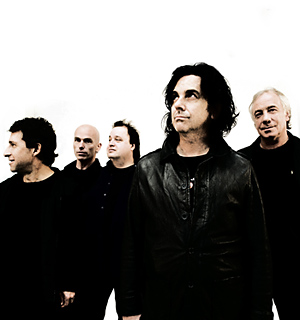 Pete: Holidays in Eden, that was a very hard album to write for us. That was probably the hardest album to write… it was the first time we’d really worked with Steve insomuch it was the first time the five of us had sat down and tried to write as a unit. With Seasons End we’d sort of compiled stuff that we had left over, stuff that we had that was good, and Steve brought in stuff that he had that was good. But with Holidays in Eden, the cupboard was bare and we had to sit down and start from scratch, and that was a hard process for us.
Pete: Holidays in Eden, that was a very hard album to write for us. That was probably the hardest album to write… it was the first time we’d really worked with Steve insomuch it was the first time the five of us had sat down and tried to write as a unit. With Seasons End we’d sort of compiled stuff that we had left over, stuff that we had that was good, and Steve brought in stuff that he had that was good. But with Holidays in Eden, the cupboard was bare and we had to sit down and start from scratch, and that was a hard process for us.
Ian: It’s the only time, probably, in our whole career that I remember feeling that we were under a lot of pressure from the record company to come up with “singles.” So the first few months were quite frustrating, though we were growing together as a band. I just remember it being a difficult time.
Mark: I’m going to tell you another computer story (laughing). I was using an Apple Macintosh, an SE I think it was, which was Steve Rothery’s, and we were trying to create a sequence for the beginning of “Splintering Heart” and of course we were having all these MIDI problems and syncing problems, so the rest of the band bought me and Steve a lab coat each, and they made those reflector things that doctors wear on their heads, but out of CDs, so we walked around with these CDs on our heads and our lab coats trying to get the bloody computer to work.
I know they got a lot of agave there because that’s where the tequila comes from. – Steve H
 1994 Brave
1994 Brave
Producer: Dave Meegan
Steve H: I tend to think of ghosts more than anything because it’s an album infused with ghosts. We recorded it in a chateau in France, which is owned by Miles Copeland, the guy who managed the Police. We turned his bedroom into a control room, we used all of the stairwells… It’s an old medieval castle, and for ambiance we had microphones absolutely everywhere, all over the castle, up in the stone stairs and the towers, and the mics were open all the time and they were feeding into the main stereo ambience of the recording. I said to Dave, “Why are all these channels open?” and he said, “If there are any ghosts on the stairs, in the towers, or in the empty rooms, they’ll be on the album.” And I reckon he caught quite a few. You kind of feel them, it’s the strangest thing.
Steve R: The original idea was to go there for two months and make the record. Unfortunately, because it was the first record we made with Dave Meegan, we weren’t really aware of the speed at which he worked, and we came away after the two months having only done the drums. But it was a great experience – especially the first month. All the tracks that we recorded were live in this huge room with a giant fireplace and lots of suits of armor, and various kinds of stone features around everywhere. The second month got a little bit too much like The Shining for my comfort. (laughs)
Mark: The record company put us under a lot of pressure to make a cheap album. They had decided we were going to make a rockin’, really cheap, album. But we had decided we were going to make something a little better than that. The final moment was when we said to Dave Meegan, “Dave, do you think we’ll be able to finish this album in about eight weeks?” when clearly we weren’t going to get it finished in time, and Dave said, “You can either make an album in eight weeks or you can make a work of art. What do you want to do?” And we said we’ll make a work of art. And he said “Right, well stop asking me how long it’s going to take then!” (laughing)
Pete: I think the disillusionment we had with some of what happened with Holidays in Eden made us kind of rebel and decide we’re gonna’ just make an album that we’re really proud of. And I think we did.
Ian: It was originally meant to be our cheapest album, but it ended up being our most expensive in the Marillion tradition. I think Brave was the album where we became a band again. I think it took three albums for Marillion to become a proper band again and it took that long for us to grow together. The whole experience was wonderful, really, and the whole process was even more organic than usual. The environment was fabulous, but it did take absolutely months and months. I did the drum tracks in about fifteen days. At the time, I was living in Florida, so I went back there. After a month or two, I made contact (with them) and asked how it was going. They said, “Well, we just have finished the basses.” So, it ended up being a lot of money, but it is an album that we’re really proud of.
You shouldn’t always trust your own feelings. – Mark
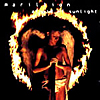 1995 Afraid of Sunlight
1995 Afraid of Sunlight
Producer: Dave Meegan
Steve H: Where do I start with that? I guess it was a time of my life when I was in a little crisis. My heart and mind were kind of unraveling at that point. I was trying to articulate how that felt in the lyrics. I think it’s reflected in the words and in the vocal performance. I think the band was sympathetic enough to work with what I was giving them as well. So I think of pain mostly, and I think of a few interesting things, mostly.
There’s a song on there called “Afraid of Sunrise” which is a song, really, about heat and sweat and desert, and the moving road, crossing Nevada in an open top car, a convertible. And yet the night I came to do the lead vocal on that song, first of all we had a problem because I’d got this line “agave flower/ sleeps besides me/ drivin’ on” and just before we recorded the vocal it occurred to me that maybe agave cacti don’t flower. So we phoned a hotel in Mexico and spoke to the receptionist – I know they got a lot of agave there because that’s where the tequila comes from (laughing), and I said, “Do you happen to know if agave cacti flower?” And she said, “I don’t know sir.” I could hear her in the background asking around to all the staff. And eventually someone came back and said, “Yes, eventually, but only rarely.” So I was like, that’s even better! So I said, “Thank you very much,” I put the phone down and went to do the lead vocals.
And having done the lead vocals it was about midnight, so I left the studio to go home, having been singing this song about extreme heat and desert. And I open the door and there was about five inches of snow that had fallen while I was singing it. That was kind of peculiar.
Steve R: The first record we made in its entirety at our studios, here, at the Racket Club in Buckinghamshire. And because of the way technology had kind of moved on, we made it on the Tascam DA-88 digital tape machine. We didn’t have to go to a studio and spend a thousand pounds a day – we could do it here.
I think it’s an album we’re very proud of. We were under pressure from EMI to deliver an album quickly because of how long we took with Brave… but I think it was a great job. It’s one of my favorite albums, still.
Mark: That was a disappointing experience recording it, because I thought it wasn’t going to be as good as Brave. I was a bit of a downer in the whole session, really, which is funny because now I look at that and listen to that album and think it’s a lot better than I thought it was at the time!
MPc: It’s actually one of our favorite Marillion albums.
Mark: I absolutely agree that I was complete wrong. It’s funny how your own perception or view at the time is different from what’s happening, which just goes to show you shouldn’t always trust your own feelings (laughing).
MPc: That’s why we have producers!
Mark: Exactly.
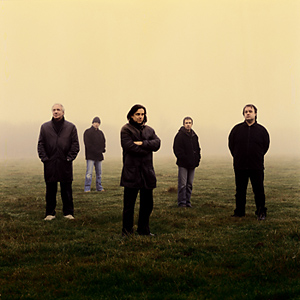 Pete: On “Afraid of Sunrise,” I played fretless bass. I tend to shy away from playing fretless bass for a whole song because frankly, I’m not that good at it – it really is not my forte. But I have one, and I do sort of play it from time to time. And we did various takes of “Afraid of sunlight” as we would do in those days. The version that we ended up using was almost a complete song. It was just one of those things where it was almost a complete take that was recorded, and Dave [Meegan] wanted to keep all of it because it had a spirit to it. But the bass…
Pete: On “Afraid of Sunrise,” I played fretless bass. I tend to shy away from playing fretless bass for a whole song because frankly, I’m not that good at it – it really is not my forte. But I have one, and I do sort of play it from time to time. And we did various takes of “Afraid of sunlight” as we would do in those days. The version that we ended up using was almost a complete song. It was just one of those things where it was almost a complete take that was recorded, and Dave [Meegan] wanted to keep all of it because it had a spirit to it. But the bass…
I’ve always thought the bass was out of tune, and I wanted to go back. And in fact, we did go back and re-record the bass, but it wasn’t as good as the original. There’s something about the original bass and the lines I just happened to play at the time against what was going on, and the drumming, and there was just something about it that was unique and special.
Ian: I remember doing little silly drum fills or something like that, just for a laugh, like when you do something for a bit of fun. David used to come out and say to me, “I really like that fill, use that one.” And I would say, “David, I was just messing around!” (laughs) Then he would go, “No, I want you to do that.” So, I remember it being fun to record and being recorded quicker, actually. But it doesn’t matter how much pressure is or isn’t on us – we just can’t really write quickly, usually. We never have been able to.
The nature of the way we write is we all go into a room and we just jam for months on end, really. No one ever seems to just come into the room and say, “Hey, I’ve got a song. This is how it goes.” I can’t remember anyone really doing that. So it can be a very frustrating process, but in the end, I think it works for us. Whenever we’ve actually sat down and tried to force any sort of direction, it always seems to go horribly wrong for us. We have a formula, but it’s one where we don’t actually know what the ingredients are outside of jamming forever, recording everything, and hoping for those little gems – those little magic moments, to happen.
Steve H. wrote a song on there called ‘Eighty Days,’ and he wrote it for the fans. And out of all the songs, the fans don’t really like that one all too well. – Ian
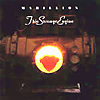 1997 This Strange Engine
1997 This Strange Engine
Producer: Marillion
Steve H: Well the title song jumps first because it’s the story of my early life. I was born in the habit of a holy woman in a holy place. I was delived by nuns in a convent and my father was in the Navy, and I did have a bulldog and a little red coat. So there’s a great deal in that song that probably sounds like that’s a foreign mythology, but it’s actually all completely true, word for word. So it’s kind of a potted history of my early life.
I was very badly cut on a ship in the North Sea and I almost bled to death before two sailors stitched my right hand back together, there not being a doctor on the ship at the time. And I did sit on the bridge of the ship and stare out at the sea bleeding to death, resigning myself to the fact that I was dying and thinking, “Well, this isn’t such a bad thing, there are worse ways to die.” So all that stuff at the end of the song about staring at the sea and bleeding, that’s all true as well.
Steve R: Some of the ideas for This Strange Engine came about from Afraid of Sunlight that hadn’t been used. Some of which were more kind-of acoustic based, partly inspired by the sort of acoustic stuff I was writing for the Wishing Tree album at the time. It was a bit of a strange album, but the first album we’d sort of produced ourselves, I suppose. Obviously, we’d got Dave Meegan involved on the mixing. But yeah, it’s got some great tracks on. It’s a bit of a mixture, but I think it’s got some real highs.
Mark: It’s really a keyboard solo album, isn’t it? (Laughing) That was totally unintentional. We just played the entire album recently, a few weeks ago [at the Marillion convention weekend]. We hadn’t ever done that one, actually, since the recording. And pretty much every track has a keyboard solo on it, which is far unusual for us, but because it was more of an acoustic guitar album, it seemed more natural that the keyboards took the solos.
Pete: That was a funny one! Coming up with the songs was quite funny because I remember Steve Hogarth went away for a while – he was gonna’ play Tommy in a rock opera (because our German promoter at the time had secured the rights for Tommy to be performed in Germany, and he wanted Steve to be the lead). So Steve went off to do various auditions and things, and that took (as these things do) quite a long time. So myself and Ian and Mark would go down to Ian’s house and sort of work on bits and pieces of music, and we had some jams already done for the album, but we didn’t really know whether we had anything of any worth, so Mark and I, and Ian, would take these jams and sort of arrange them and rework them, and then we’d replay them into Mark’s computer using MIDI instruments.
Ian: This Strange Engine could be one of my favorite albums in a way. It’s a very song-based album and it’s very acoustic... Steve H. wrote a song on there called “Eighty Days,” and he wrote it for the fans. And out of all the songs, the fans don’t really like that one all too well, which I think is quite funny! (laughs)
We just wanted to do something different.– Pete
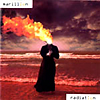 1998 Radiation
1998 Radiation
Producer: Marillion
Steve H: The first thing I think of with Radiation is injustice because I kind of get the feeling, from a lot of the feedback I get from the fans, that that’s the album everyone likes the least.
MPc: I love that album!
Steve: Well good, man! (laughing) That’s what I mean. I think it’s a fantasitic collection of songs and I’m really proud of it. I’m really proud of “Three Minute Boy.”
MPc: Your “Three Minute Boy” song is almost six minutes long! (Laughs) I made a note of that to talk about the eccentricity that perhaps encompasses some of Marillion.
Steve: So much for truth then! As I’m sitting here banging on about truth, I’ve gone and wrote a song called “Three Minute Boy” and it’s six minutes long. That’s why all my eggs are hard. Let me go dip my bread in the yolk. (laughing) It’s a great collection of songs. “A Few Words For The Dead” is a statement I’m very proud of having made. That sums up how I feel about the way the world feels and the way the world could be.
Steve R: Radiation was a very difficult album to make. There was an attempt to kind of reinvent the band, I suppose, with the idea of trying to make us sound young and angry. (laughs) I mean, how do you make us sound angry? (laughs) It’s one of those records… it’s got some great songs on it, but sonically I’d love to hear those same songs mixed in a more conventional manner because I think it’s quite an abrasive album [to listen to]. And that kind of puts some people off if they kind of can’t get beyond the sonic qualities of the album.
Mark: Mike Hunter is going to have a go at remixing one or two of the tracks when he has some time. It wasn’t really as good sounding as it could have been.
Pete: Radiation was one of those moments in history when we decided that we wanted to change; we just wanted to do something different. We wanted to be a bit more adventurous with our sounds. I think we felt that we’d done an awful lot of Marillion type stuff and we wanted to approach it all differently. I mean, we always do each album different to the last one – that’s the main, the only, rule we have in music is that you can’t repeat yourself, which is why we try and be more inventive with each album.
But Radiation was a point where we wanted to change everything. We changed guitar styles. We changed keyboard sounds. Kinda’ shake it all up a bit. It’s a shame because a lot of people didn’t relay like it at the time, and it took a long time for people to really get to know that album because of that, but its got some great tracks on it.
We actually ended up re-mastering it. We had it mastered in England and it sounded very harsh, and the sounds were quite harsh, and the way we recorded it was quite harsh. Anyway, we ended up re-mastering it for America. And the American version sounds better. Sounds a bit warmer.
Ian: There are some good songs on Radiation that we revisited in the last year or two that are really good live, but it’s my least favorite album of all our albums, just sonically. I still think there are some good songs on there. “Cathedral Wall” is on the album, I believe. Live, that really rocks out and is really good!
MPc: Before we move on, now every time I listen to the song “Under The Sun” I can’t help to think of Al Gore’s documentary film An Inconvenient Truth. Have you seen the film?
Steve H: No, I haven’t seen the film , [but] I’m hearing about it. They’re talking about it a lot on TV here at the moment. But that’s what the song’s really about. It’s a tongue-in-cheek celebration of global warming.
Marillion.com was the beginning of our whole Internet rebirth.– Mark
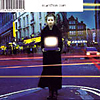 1999 Marillion.com
1999 Marillion.com
Producer: Marillion
Steve H: You’ve moved into an interesting area about music at this point because that’s the album I can never remember what’s on it! I’ve gotten that John Lennon thing. I remember an interview with John Lennon years ago where he actually didn’t know which songs were on which album and I remember being appalled by that because each one of those albums were so sacred to me. And it made my head spin to think that he couldn’t remember. Now I realize that… (laughs) Yes, give me a clue.
MPc: “A Legacy,” “Deserve,” “Go!” “Rich,” “Enlightened,” “Built-in Bastard Radar,” “Tumble Down The Years.” Any of these songs ring a bell?
Steve: Yeah, they do! (laughing) That must have been one of the last albums that John Helmer really contributed to because a lot of those songs were Helmer lyrics; they weren’t me. He wrote “A Legacy” and he wrote “Tumble Down The Years” as well. Whereas I did “Enlightened” and “Go!” of course. “Go!” is a great song.
Marillion.com really goes by as a blur through my head. And I don’t know why. I think I must have been having one of those long weekends that particular year. I think “Enlightened” is really kind of precious, a beautiful feeling sort of song. It’s really a song that Jimmy Hendrix could have written out of everything we’ve ever done. I would love to hear him do that. I would love to hear him play it while I sing. That would have been a dream.
Steve R: Not many memories from it really, other than the feeling of us wanting to take control of our career [from the record companies] and our frustration with the business.
Mark: That period was a bit depressing for us in terms of the career of the band. But Marillion.com was the beginning of our whole Internet rebirth, so in that regard, it was exciting to know that we weren’t going to be signing to another record label after that.
Pete: Me and my kids. Me and my two sons are on the front cover. ‘Cause you know one of the things we’d done was asked people to send their pictures in for the cover. And so that’s one thing. But what should I tell you about, interestingly enough, [is that] quite a lot of the songs for Marillion.com were written at the same time as Radiation, and we had a similar situation to what we have now [with Somewhere Else] where we had leftover songs, and we kind of made two lists of songs: one for Radiation, which were the ones we actually worked on, and then all these other leftover ideas.
Ian: I can’t remember much about recording this album, and I think the rest of the band feels the same way, which is quite extraordinary. But I think it was due to the predicament we were in at the time. We had left EMI after Afraid of Sunlight and we had gone with independent labels. We were quite frustrated with the independent label scene and just wanted to get out of that, really. We were in the wilderness a little bit with record companies and whatnot and the Internet. And that was the turning point. We saw it coming – the Internet. That’s why we called the album Marillion.Com.
We had a massive responsibility to the fans to make sure that it was going to be a really good album because they had given us their money up front.– Ian
 2001 Anoraknophobia
2001 Anoraknophobia
Producer: Dave Meegan
MPc: And now we move on to Anoraknophobia. Steve, I would imagine you remember this one pretty well?
Steve H: Yeah, Anoraknophobia I do remember well. (laughs) “Quartz” and “This is the 21st Century” which I think is probably a high point. That was me getting back together again with [producer] Dave Meegan of course. So it was great to have him back in the room working together with us ‘cause I’d missed him. Of course that was the album fans bought before they’d heard it, so it was a great leap of faith that had already been made.
MPc: What was that like, having the experience of 12,000 fans pre-ordering the record?
Steve H: It was incredible, and we really felt we were on the front of something. It was actually the American tour front for This Strange Engine that taught us two things. First of all, it showed us what the Internet was going to be because a great many of you guys [in the states] were using it in ’97, and over here in Europe it was just a buzzword. Nobody really quite knew what it was. And in fact, people were even pointing and laughing at anyone who was even attempting to use the Internet. It was though of as something only strictly for computer geeks here in Europe.
After the American fans got together and raised $60,000 for us to go and tour in America, we kind of sat bolt upright and realized that the Internet was going to be “where it’s at” and we better get onto it. And secondly, it woke us to the fact that our fans were prepared to put their money where their mouths and hearts were. And they would actually support us in very real terms way beyond going into a shop and buying a record.
So it was a consequence of those two things really that led to the idea that first of all, we realized that we had to gather as many email addresses as we possibly could around the world. And so we persuaded our record label at the time when we released This Strange Engine to include a mail-back card, and we offered another CD for free. All you had to do was ask us for it, and we mailed another CD…. We gave it to anyone who asked for it purely so we could collect names and addresses. Our database went from being 5,000 people, which was the membership of our fan club, to about 45,000 people in about a month! That really meant we’d got some way to know who was listening to our music. That really empowered us and enabled us to get away from the major labels in the music business.
Steve R: My sound changed on that record, with using the Blade guitars and the [Groove Tubes] Trio and the [Lexicon] MPX kind of effects unit, and also, a lot of it was kind of written with loops. I’ve got a [Korg] Triton keyboard which I’d brought down, and wrote a lot of percussive loops and sometimes that sort of twinkly sequence part of the beginning of “When I Meet God,” that sort of came from the Triton, and I find that really fun to work with because I could literally press a button and it creates rhythmic backdrops.
A lot of what I try and do is very much, sort of, based around phrasing, so having something that gives you that rhythmical backdrop (or sometimes even a very basic melodic pattern), I found quite interesting.
Mark: We stepped up a gear there. You sort of go in peaks and troughs, and certainly had a peak around Brave and Afraid of Sunlight, and then there was a bit of a trough for a few years, and then we were back in our stride, I felt. We found a new energy and we were raring to go. Musically, that album was much more enjoyable, and working with Dave Megan again... that was a good time.
Pete: We were in the position with Anoraknophobia where we were doing it for ourselves [on our own label], and we’d had the [wildly successful] preorder campaign, so we were in very, very good spirits at the time, and I think that’s reflected in the music. I think we kind of felt invincible. We felt a lot of love and a lot of trust and a lot of faith from all the people that had helped us out with donations, allowing us to record the album.
That consequently led to us doing some quite strange and wacky things on the album. For example, “If My Heart Were A Ball It Would Roll Up Hill” is pretty far out. I’m very pleased with it. And it was nice it was nice to get Dave back in the fold for that album as well. That’s one of the things that that campaign really helped us with – getting back to recording proper albums. ‘Cause those three – This Strange Engine, Radiation and Dot.com were, you know… we were struggling a bit, I think, to find our way, and we were disenchanted with the record labels we’d signed to, and now with Anoraknophobia, there was a sense of us taking control and doing it right you know, and getting it back.
Ian: Anoraknophobia was an exciting time, actually. When we would go in to jam and write, Steve Rothery would start some loops going and we would just jam along with those, which became “Between You and Me” and also “21st Century.” It was quite an exciting time because it was the first time we did the “pre-order.” It was exciting, but daunting at the same time, because we felt we had a massive responsibility to the fans to make sure that it was going to be a really good album because they had given their money up front. They had given us their money up front, before we had written a note, which was an amazing feeling, really.
Wow, what a thing Marbles is. That was like Brave but ten times as intense. – Pete
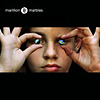 2004 Marbles
2004 Marbles
Producer: Dave Meegan
Steve H: Well that’s all true as well, of course. I use to play marbles with my best mate during the summer days when I was a kid. And I did whack them up into the air with a tennis racket one day and destroyed most of the green houses and the roofs of the housing estate my parents lived in. And I was punished by my dad giving all my marbles away to the kid up the street. It took me a long time to forgive him for that. In fact, he bought me marbles for my 45th Christmas (laughs) by way of an apology.
So it’s a nostalgic album and I think it’s another great piece of spiritual production by Dave Meegan. I think he’s managed to capture an awful lot of spirit and magic in there.
Steve R: Marbles took a long time to make. I think sonically it’s a great sounding record. I think we kind of grew up a little bit in the making of the record in terms of me sort-of having gone from using the transistor amp and the EMG type Strat to the more natural toned [valve] sound that I’ve used in the last couple of albums. I think on that album I kind of managed to finally nail what I was trying to get sonically.
It was a fun record to do. We all took various duties in terms of writing, like “Don’t Hurt Yourself” – the acoustic guitar was played by Pete; bass guitar was played by me. “Youre Gone” – a keyboard-based song, I wrote three of the four sequences on a keyboard using [Apple] Logic, which was triggering [Tascam] GigaStudio with lots of orchestral sorts of string sounds. So I suppose it held a bit more of an openness in terms of who does what in the band. “Drilling Holes” was one of Pete’s ideas for the main chord part of the song.
So we all experimented maybe a little bit more on Marbles. And I think it works very well. I think the whole… it’s got a very strong identity, that record. I don’t think they’re actually the best songs that we’ve written, but I think there are some great songs on there, and I think the whole artwork and the whole package, if you will, gives it a very strong identity.
Mark: I had this idea that it wouldn’t be just a collection of songs. I always wanted it to have things that weren’t really songs, and what came out of that were the four Marbles bits. That sort of paved the way for Steve – he had these similar marble lyrics. Rather than try to turn the lyric into one song, we created four bits and pieces of music using parts of the lyric, and you can hear how one lyric can be quite different depending on what music it’s put to.
Pete: Wow, what a thing Marbles is. That was like Brave but ten times as intense for me. I had this sense that it was gonna’ be an amazing album. And it was simply because we started out writing some songs, and we’d done in a sense with Anoraknophobia what Radiation had wanted to do. What we’d wanted to do with Radiation we actually achieved with Anoraknophobia. We turned the music upside down with songs like “Quartz,” but we did it in a really good way, and a really listenable way, and in a way that a lot of people got on board with, which was nice.
With Marbles I think we’d felt we’d done that and we just got back to writing some really good classic songs, you know? That’s kind of where I felt we were going with Marbles. And it was really nice because some of the songs actually sound like they could come off a hunky dory by David Bowie or one of those kinds of classic albums that everyone has in their record collection. So I’m really proud of the way it worked out.
And halfway through the writing we realized that we had so many songs. The decision to make a double album really helped as well because then you haven’t got the pressure where every song’s got to mean something. If you’re trying to write for forty-five to fifty minutes of music, everything – every ounce of that, has got to mean something and it’s got to be really important, whereas if you’re writing a double album you can experiment more, and that’s how a song like “The Damage,” for example, is allowed to live (laughs), or “Drilling Holes.” That was a classic example of a song that if we’d been writing a single album, would not have made it because everyone would’ve thought, “Well that’s a nice, wacky idea, but it’s not serious enough to be on an album.” But because it was a double album, there’s enough room for that song to breathe alongside “Neverland” and alongside “Ocean Cloud,” even if you’ve got “You’re Gone” and those other songs as well, so there’s a massive balance there. Huge balance. And it all plays a part in making it special.
Ian: As I’ve said, with the writing process, we never know what kind of album we are going to write. We never sit around in a circle and say, “OK, this is going to be a concept album” or “this is going to have three minute pop songs” or anything. We just always go in with a blank canvas and just jam and see what happens. Marbles felt like it came together quite quickly, but it actually didn’t. It took forever – it took a year! (laughs)
It was Dave Megan, really, that pulled a lot of the things together. The four little “Marbles” sections that appear on the album; it was Dave that actually said to Steve H., “Look, I think these could be recurring themes that could be coming up through the album.” It kind of pulled it all together, and kind of made it feel like a concept album a little.
One of my favorites from that album was “Invisible Man.” I really enjoyed playing that and the intensity of it. And I think “Fantastic Place” is a great song. And also, this time, we decided that all of the [fan pre-order] money that we got, we decided to do all the promotion ourselves. So we put back just about every penny into promoting the album and, of course, our fans put it in the top ten in England with a single. That was a fantastic feeling, and it certainly had people like my next door neighbors saying, “Hey, I saw you on Top of The Pops” and “I saw you on TV.”


